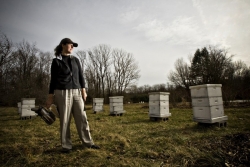Apiculturist Horn's New Book Looks at "Beeconomy"
Honoring the example set years ago by her bee-keeping paternal grandmother in Appalachian Kentucky, Eastern Kentucky University apiculturist Dr. Tammy Horn suggests in her newest book that beekeeping might once again be a path to economic self-sufficiency for women and families.
“Beeconomy: What Women and Bees Can Teach Us about Local Trade and the Global Market,” published by University Press of Kentucky, examines the evolution of the relationship between women and bees around the world and explains why women should consider becoming beekeepers.
Horn said the book, due to hit store shelves in November, is especially timely given the worldwide economic downturn and because it “reminds people of what we have done in past generations to provide for our families. If something that comes out of the recession is more beekeepers, that’s a good thing.”
For example, the author cited how beekeeping “filled a niche” during the rationing of World Wars I and II. For many reasons, beekeeping began to wane in the Baby Boomer years but is now seeing a resurgence, in rural and urban settings alike. In many cases, women are leading the way, just as Horn’s grandmother and other females did in previous generations.
“This is really her book,” Horn said. “It’s a way of trying to give shape to memories I don’t have, and a way of honoring her. It’s not unusual for women and bees to be connected in this region at all. It’s a part of our sustainable culture and a part of a barter economy.”
As the director of Coal Country Beeworks, an apiforestation initiative of the Eastern Kentucky Environmental Research Institute at EKU, Horn is at the forefront of helping more Appalachian women see the possibilities in beekeeping. But to conduct research for this book, she also traveled to four other continents – Australia, South America, Africa and Europe – and in every corner of the globe witnessed “the creativity that women bring to the table” to help themselves and their families make fiscal ends meet.
“The recession is impacting women more than men,” Horn said, noting that most job bills focus on the infrastructure, an employment sector dominated by males.
“Women make less than men, and beekeeping can be a way to supplement income,” she added. “Women live longer than men, so they may need to supplement their income in some way. Also, women are still generally the primary caregivers and food-preparers for the very young and very old. That stewardship, to me, is a reason for women to consider hive-related products in family diets and nutrition. Honey is much better for many people than refined sugars.”
The women profiled in Horn’s book suggest ways of managing careers, gender discrimination, motherhood, marriage and single-parenting, all while enjoying the community of women beekeepers, greater financial freedom and helping the environment.
Just as her newest book honors her paternal grandmother, Horn said her first book, “Bees in America: How the Honey Bee Shaped A Nation,” was more a tribute to her maternal grandfather, under whose tutelage she became a beekeeper.
Horn, who was born in Harlan County in southeastern Kentucky, has gone on to become a nationally prominent expert and frequent speaker on beekeeping, especially as it relates to reclaiming surface mine sites with pollinator forage and habitat. Her work has been featured in the New York Times, and last year Horn received the North American Pollinator Protection Campaign’s Pollinator Advocate Award for the U.S.
She already is at work on her third book, “Apiforestation: The Future of Beekeeping,” which she says will complete a past-present-future trilogy on the subject of beekeeping.
Several book signing/discussion events are scheduled in November for “Beeconomy”: Morris Book Shop, Lexington, Nov. 5, 2 p.m.; First Presbyterian Church, Richmond, Nov. 16, 6 p.m.; and Joseph-Beth Booksellers, Lexington, Nov. 26, 2 p.m.
Contact Information
Dr. Tammy Horn
tammy.horn@eku.edu
859-622-6914
Published on October 20, 2011
